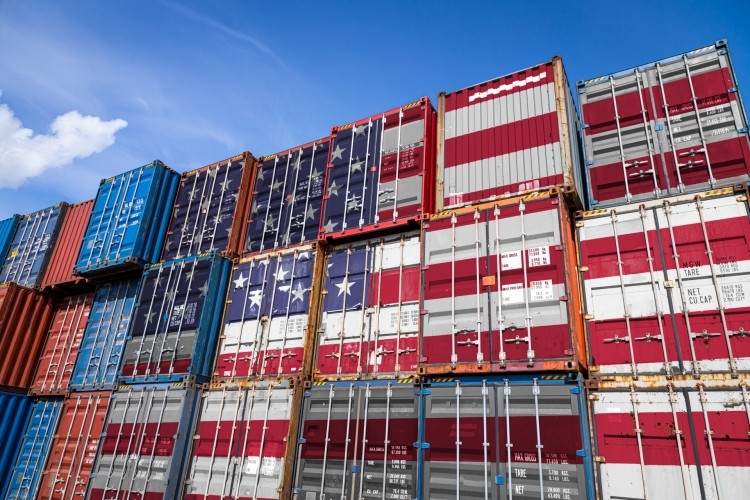Tariffs on goods from the European Union or China may trigger turbulence in Polish economy
- Oprac. M.K.
- Kategoria: English zone
Several-dozen-percent tariffs imposed by the Donald Trump administration on goods from the European Union or China may trigger significant turbulence in the Polish economy, but there is potential hidden within this pressure. Experts from Fulfilio, a provider of logistics services for e-commerce, point out that Poland, as an attractive production and logistics location, may attract investors fleeing from an increasingly expensive Western Europe. Moreover, thanks to its well-developed infrastructure and expertise in e-commerce operations, Poland has a chance to become a key transit hub for Chinese goods destined for the U.S. market. The end of the T86 rule is also of particular importance for Poland.
- The trade war initiated by Donald Trump’s administration, although at first glance unfavorable for global trade, may present a unique strategic opportunity for Poland. Thanks to its geographical location, developed logistics infrastructure, and competencies in e-commerce operations, Poland has a chance to become a key transit hub for Chinese goods headed to the U.S. market. We are already witnessing increased interest from Chinese operators in expanding their supply chains using Polish logistics centers and local partners. However, this is not only an opportunity for the development of the Polish logistics sector but also a good time to attract new investments in the industrial real estate sector or services for e-commerce. This potential should be harnessed to become a key link in the global supply chain - emphasizes Arkadiusz Filipowski, CEO of Fulfilio.
The T86 Rule
In the context of U.S. presidential trade policy, it is worth mentioning the T86 rule, which allowed for duty-free imports to the United States of shipments valued up to $800. Over recent years, it has significantly contributed to the increase in the volume of small parcels reaching the U.S. market, especially from China. Although the regulation itself is not the main focus of the current changes, its modifications further complicate the landscape of international trade, pushing sellers to seek new, more cost-effective distribution channels.
The number of parcels covered by T86 increased from 139 million units in 2015 to approximately 1.36 billion in 2024. Over 60 percent of these originated in China. In the dynamic field of cross-border e-commerce, recent fluctuations in U.S. trade policy, including changes to T86, have triggered a shockwave in the industry. Every shift in tariff policy - especially those introduced overnight-is like a boulder thrown into the lake of cross-border e-commerce, sending ripples that affect every link from the supply chain to the point of sale. Sellers—from small and medium-sized enterprises relying on direct shipping of small parcels to large corporations with overseas warehouses-are now closely monitoring policy trends and actively seeking countermeasures.
- says the CEO of Fulfilio.
Potential Gains
Fluctuations in U.S. customs policy, including uncertainty surrounding the T86 rule, are creating new playing conditions in cross-border trade. Poland can emerge victorious in this scenario in three key areas.
First, for the fulfillment sector, this means increased demand for warehousing, packaging, and order fulfillment services, especially from platforms and sellers aiming to bypass direct deliveries from China to the U.S. Second, the growing importance of Poland as a buffer in transcontinental trade may lead to a boom in the warehousing and courier markets, benefiting industrial property operators, logistics companies, and fulfillment service providers like Fulfilio. This is a natural consequence of the global search for solutions that avoid the direct costs of new tariffs. And finally, consumers themselves will benefit - especially those looking for the lowest prices. The influx of inexpensive products from China, bypassing higher tariffs, means greater price competition in e-commerce.
Potential Losses
At the same time, Fulfilio experts note that the dynamic changes in the market may come with certain challenges. The side effects may be painful for local retailers. With the influx of cheap products from China, which will be warehoused and shipped from Poland, price pressure on domestic e-sellers - especially those operating on platforms like Allegro - will increase significantly. Companies unable to compete on price will have to intensify investments in quality, customer service, and brand development. A possible side effect could be further market polarization - with low-quality, attractively priced products dominating one side, and niches for premium brands and value-added products on the other.
Poland can benefit from the new wave of American protectionism, provided it makes proper use of its infrastructural and logistical advantages. At Fulfilio, we are already preparing for growing demand from international partners and analyzing scenarios for further development of our operational network. For us, this is not only an opportunity but a responsibility - to respond to global challenges with a flexible and scalable operational model.
– says Arkadiusz Filipowski.
Source: Fulfilio



